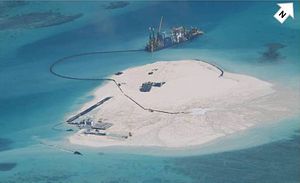A China News Service piece republished by several Chinese media outlets gives a rare glimpse into the “bittersweet” lives of Chinese soldiers stationed on various outposts in the Spratlys. The piece includes photographs of Chinese soldiers on patrol on Fiery Cross Reef and participating in drills on Johnson South Reef.
According to the article, soldiers rise at 6 a.m. and spend their days doing firearms training and island defense drills. At night, they take shifts standing guard. Their task is made harder by “unidentified vessels” that sometimes come close to “harass” the reefs. During such times, soldiers might go several days without adequate rest.
The article highlights the bravery of China’s Spratlys soldiers in the face of harsh conditions — heat (sometimes in excess of 60 degrees centigrade), humidity, and even frequent typhoons. Plus, the soldiers face immense “psychological pressure,” particularly the loneliness that comes from being stationed in the middle of the ocean, hundreds of miles away from their families. During Spring Festival, when other Chinese are heading home, the soldiers stage plays and performances in the Spratlys to celebrate the lunar new year.
And yet despite the hardship, the piece claims, soldiers request this garrison duty, even when they have a chance to transfer away from the South China Sea. One solider even said that he will come back to guard the Spratlys if he is reincarnated as a soldier in the next life.
The reason for this devotion? According to the piece, the soldiers take a fierce pride in defending the Spratlys, referred to as the “front line” for China. The piece makes this theme quite explicit: “For more than 20 years, generations of reef-guarding soldiers have endured hardships and deprivations ordinary people would have a hard time accepting, defending our homeland’s sacred territory.”
It’s not only the soldiers who are patriotically devoted to the Spratlys, either. One solider stationed on Subi Reef told China News Service the only way the soldiers could endure was because “we constantly feel our powerful country at our backs, supporting us.” Implicitly, then, any Chinese who isn’t devoted to defending the Spratlys is letting these brave soldiers down.
Interestingly, all three of the reefs mentioned by name in the piece – Subi Reef, Johnson South Reef, and Fiery Cross Reef – are part of China’s ongoing land reclamation and construction projects in the South China Sea. Those activities are never directly mentioned in the piece, but the article makes the case for construction in a roundabout way, by emphasizing the poor conditions on the shoals. China’s Foreign Ministry has made this argument directly, saying that China’s construction in the South China Sea aims at “improving the living and working conditions of personnel stationed there.”
For one thing, the piece notes that because the islands are so small (or perhaps “were so small” is a more appropriate way of putting it), the soldiers have no room to exercise, forcing them to rely on pull-ups, push-ups, and “frog jumps” to stay in shape.
Another section of the piece notes how living standards on the islands have improved — perhaps thanks to the ongoing construction. Soldiers can now access the internet and watch movies. Plus, new “earthworks” allow the troops to plant their own vegetables — possibly the most benign explanation yet of China’s construction activities in the Spratlys.

































